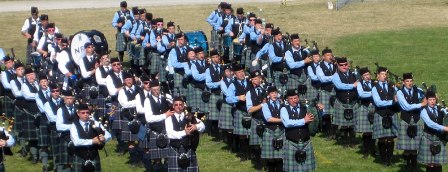THE ANTIGONISH HIGHLAND GAMES
 A week- long celebration of music, dance and athleticism, the Antigonish Highland Games is one of the oldest North American gatherings of its kind, suspended for only a couple of years at the height of wartime. Steeped in highland Scottish history, the small university town and surrounding communities offer leisurely lobster and salmon suppers, planned concerts and impromptu ceilidhs, road and cycling races, church services, street fairs, and three days of intense competition.
A week- long celebration of music, dance and athleticism, the Antigonish Highland Games is one of the oldest North American gatherings of its kind, suspended for only a couple of years at the height of wartime. Steeped in highland Scottish history, the small university town and surrounding communities offer leisurely lobster and salmon suppers, planned concerts and impromptu ceilidhs, road and cycling races, church services, street fairs, and three days of intense competition.
A dozen or so pipe bands, their 400 members decked out in distinctive tartans, and 200 dancers in colourful kilts lead the competitors. They are far outnumbered, however, by the thousands who come to watch and listen, sharing Gaelic greetings and stories.
“People plan their holidays around the Games,” says Paul Boyd, president of the Antigonish Highland Society. “We’ll have some for whom it is a homecoming, but we draw visitors from all over Atlantic Canada and well beyond. If you love highland culture and competition, Antigonish is one of the events you have to visit.”
The heavy events attract professionals who travel the festival circuit each summer. An added feature this year will be a competition between Canada and the United States for cash and bragging rights.
“We’ll have all the usual events including the caber, hammer and stones and we’re really looking forward to the international competition between five athletes from each country,” notes Boyd.
Another crowd-pleaser is the Cuairt nan Tuthanach – or Farmer’s Walk – which harkens back to the days when a farmer’s physical prowess often held the key to the success of his harvest.
“It is a bit of a change from the professionals, as anyone can compete,” explains Boyd. “You just have to be able to carry a 202 lb torpedo-shaped weight in each hand and walk a distance of 100 feet in as short a time as possible.”
A few years ago a young man from a farm in a neighboring county delighted the audience when he won the event. At six feet tall and just over 200 pounds, 25 year-old Marco MacLeod was one of the smallest competitors on the field when he completed the distance in a triumphant 9.01 seconds.
The caber toss at the Antigonish games is considered particularly challenging, Boyd points out.
“We will be using a Nova Scotia spruce weighing in at somewhere between 100 and 150 pounds so that is going to take strength and skill.”
A scenic bike race from Antigonish around Cape George Point is also part of this year’s games package. The winding route – sometimes referred to as the mini-Cabot Trail – will snake up and down hills, passing a picturesque lighthouse and several fishing communities along St. George’s Bay, including Ballentyne’s Cove, known for its tuna fishery.
“We’ll also have quite a gathering of the clans with tents set up around the field,” adds Boyd. “People can drop by to get information on their own clans or clan activities.”
Another highlight will be The Keppoch Ceilidh, a 1950s-era kitchen party where Scottish and Irish neighbours from a mountain community gather to share a few songs and tunes on the fiddle and pipes.
“It is reminiscent of the era where people generated their own entertainment, either on the fiddle, in song or through stories and jokes about the challenges of farming or the goings on at home or in the Boston States,” explains producer Duncan MacDonald.
There are evening ceilidhs for those who like to retire early, other events where the music and drinks circulate late into the night, a kilted golf tournament, and a competitive program for children known as Tir Nan Og which, loosely translated, means “land of youth.”
With three daughters who embraced highland dancing, Boyd has been to his fair share of highland games. The experiences triggered his interest in local history.
“My family is typical of many others in this part of Nova Scotia. Our people came out from western Scotland, a place called Arienskill, in 1801. They sailed into Pictou Harbour and made their way east to Antigonish, where they prospered through fishing and farming.”
The land where the Boyd pioneers settled is still in his family so a few years ago he had a monument erected and added a Gaelic road sign, acknowledging the community along the Road to the Isles where the family originated.
“In 153 years the mandate of the games has never really changed. We honor the language, the music and the customs of the Scottish pioneers who settled here and we extend our hospitality to everyone.”
www.antigonishhighlandgames.ca


















